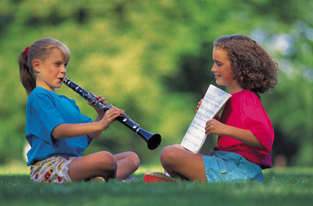
Auditory kids pay the most attention to sounds. To them, voices, tones, pitches and rhythms provide a wealth of information and carry emotions that other kids simply ignore. They have superior abilities to “record” and “play back” TV shows, skits, songs and conversations. On the other hand, they are sequential thinkers and must be able to focus on one thing at a time.
[This is the last installment of tips for stimulating kids with different communication styles, following my post Diagnosing Learning Difficulties and Gifted Children in the Early Years.]
Auditory kids can often be distinguished by the way they look down and talk to themselves. Their self-talk is often louder than what goes on in the outside world. On the other hand, they are distracted by sounds and disturbed by unpleasant or loud noises.
Here are some ideas that will help auditory kids learn better, be happier and love learning:
- Listening to music – find out what kind of music they like and use it to set their mood before, during (softly, in the background) or after (as a reward) learning. If the music contains words relating to the topic of learning, auditory kids will learn the topic quicker
 Playing music – teach them to count using the piano keys and help them remember colours and other lists by associating them with music
Playing music – teach them to count using the piano keys and help them remember colours and other lists by associating them with music- Rhythm activities – adding a beat to anything and speaking with a beat make the content come to life. Your child may want to tap along. Let them
- Keeping a calm, cheerful voice – auditory kids often classify their teachers by the loudness and pitch of their voice and prefer the soft-spoken ones, who use varied intonation
- Role play – auditory kids can be taught anything, as long as it is associated with sound effects, a funny voice, an accent or even a lisp
- Story telling – use stories with more dialogue than descriptions and “act out” the different characters in the story. Gradually, let your child participate and read some of the characters
- Singing – compose any material into a song and it comes alive for auditory children. All you have to do is write it to the tune of a familiar song and they will love it
- Puppet show – similar to story telling and role play
- Verbal affirmations – auditory kids prefer verbal communication and their self-talk tends to spiral down. To pick up their spirits, say something encouraging to them every once in a while and see them smile
- Record and listen to themselves – show them how to use a tape recorded, an MP3 recorder or the computer for recording their own voice and then playing it back. Encourage them to do little singing or voice acting projects and then proudly play them for you
- Let them make noise and repeat things out loud – this helps them work things out, but when you like the sounds an auditory child makes, you like the child and this will help them do everything better
Happy parenting
Ronit
This post is part of the series How to Stimulate Kids:
- How to Stimulate Visual Kids
- How to Stimulate Kinaesthetic Kids
- How to Stimulate Digital Kids
- How to Stimulate Auditory Kids
 Playing music – teach them to count using the piano keys and help them remember colours and other lists by associating them with music
Playing music – teach them to count using the piano keys and help them remember colours and other lists by associating them with music










